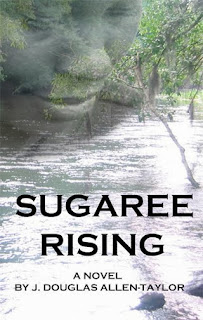Freedom Voices
For More Information
Contact: sugaree@freedomvoices.org
Sugaree Rising www.sugareerising.com.
February 1, 2012--San Francisco, CA Freedom Voices announces this week the acquisition of publishing rights for Sugaree Rising, Bay Area author, journalist, and political columnist J. Douglas Allen-Taylor's first novel.
Set in the South Carolina coastal area Lowcountry in the late Depression years, Sugaree Rising is the story of community resistance to a massive community relocation forced by a Tennessee Valley Authority (TVA)-style dam building and rural electrification project. The novel also details the struggles of a unique group of Lowcountry African-American people-commonly known as "the Gullah"-to maintain a religion and culture largely based in their ancestral African homeland.
Allen-Taylor's novel is loosely based upon the Santee Cooper Project, the 1930's era initiative that carved out two major lakes in the heart of South Carolina, brought electrification to scores of rural communities, but in the process dislocated more than 900 families, most of them African-American.
Freedom Voices editor B. Jesse Clarke calls Sugaree Rising "a very solid piece of work. The characterizations and the evocation of place and time are consistent, intelligent and well paced. The weave between spirit and practicality is nearly seamless. Mr. Allen-Taylor certainly had a wide range of publishing choices for such a quality novel. We're very happy that he has chosen to publish with Freedom Voices."
Because Allen-Taylor's novel crosses several established genres, Freedom Voices expects Sugaree Rising to have success in the African-American, women's, historical fiction, literary fiction, and Southern fiction markets.
An early reviewer says of Sugaree Rising: "Set in 1935-36, the background drama of the story is drawn from a real event, the building of the Santee River Dam, a New Deal project designed to control floods, provide jobs for the unemployed, and electricity to the rural areas. The novel opens with the Kinlaw family learning that their home and the homes of all their relatives on [Manigault] Hill will be flooded by the proposed construction; the graves of their ancestors covered by lakes to be enjoyed by 'cracker' fishermen. Having heard these rumors before, they were doubtful because they could not understand what good electricity would do anyone living underwater, and they furthermore did not think that the white 'buckra' would ever flood their own homes, fields, and graveyards. Rather than employ the usual dichotomies of white and black, industrial and agricultural, modern and pre-modern, Allen-Taylor's story takes an interesting twist. Buried deep among the ancillary tales of tricksters, the supernatural, and hoodoo is the unique coming of age story of protagonist Yally Kinlaw who, as she approaches the age of sixteen, is one of the most appealing young literary characters since ['To Kill A Mockingbird's'] Scout Finch."
Allen-Taylor describes Sugaree Rising as a work of "African-American spirit naturalism," which he describes as distinctly different from the more well-known genre of "magic realism." "The African-Americans of the Lowcountry do not view death and life and the spirit-world and the 'real world' as separate entities," Allen-Taylor said. "They see them as parallel existences that can and do interact, under the right circumstances, much as scientists describe the relationship with parallel universes or dimensions. And so the Lowcountry Black Folk don't stop in the middle of a discussion and say, 'okay, now we're going to tell a ghost story.' Their lives are always intertwined with the spirit world. There is no separation or distinction."
Allen-Taylor said he also wrote Sugaree Rising, in part, to counteract the broad, negative view of what he calls "the elder African religions," popularly categorized under the general term of "voodoo" and widely used as the source of ridicule in American books and film.
While several novels were published describing resistance to the more-famous Tennessee Valley Authority (TVA) project along the Tennessee River-including Borden Deal's Dunbar's Cove and William Bradford Huie's Mud On The Stars--Sugaree Rising is one of the first novels depicting South Carolina's major rural electrification effort of the Depression years.
About J. Douglas Allen-Taylor
J. Douglas Allen-Taylor is an award-winning journalist and political columnist who has written for several San Francisco Bay Area publications, including The East Bay Express, San Jose Metro, The Berkeley Daily Planet, Color Lines, and Race, Poverty & the Environment. He is a native of Oakland, California and lived for many years in the South Carolina Lowcountry, where "Sugaree Rising" is based.
Sent from my BlackBerry wireless device from MTN


No comments:
Post a Comment